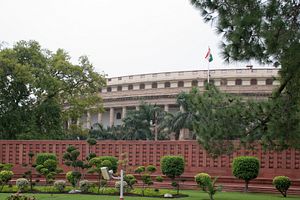Fulfilling predictions from earlier this summer, India’s Congress Party was officially denied leadership of the opposition in parliament. Sumitra Mahajan, speaker of the Lok Sabha, conveyed the decision in writing to Congress Party President Sonia Gandhi. According to Mahajan, the decision was made with India’s Attorney General Mukul Rohatgi and enforces the “rules and tradition” of the Indian parliament, which state that a party in opposition must have at least 55 seats within the Lok Sabha to rightfully gain claim the mantle of the opposition leader. The Congress Party won just 44 seats in May’s election, rendering it unable to qualify to lead the opposition. The decision is a major blow to the Congress Party, which has historically been a major force in Indian politics. More importantly, the lack of an opposition leader will significantly strengthen the Bharatiya Janata Party’s (BJP) ability to govern unfettered by a robust opposition.
While Congress alone won just 44 Lok Sabha seats, with its allies in the United Progress Alliance coalition, it met the required 55 benchmark. Prior to Mahajan’s decision, Congress petitioned to lead the opposition with the signatures of over 60 legislators. The speaker’s rebuttal, however, asserted that in order to lead the opposition, a party must field 55 of its own members. Presumably, allowing for coalitions to lead the opposition could lead to patchwork alliances of regional parties. Further damaging the Congress Party bid to lead the opposition was the reluctance of two particularly strong regional parties — the South India-based All India Anna Dravida Munnetra Khazagam (37 seats) and the West Bengal-based All India Trinamool Congress (34 seats) — to cooperate with the Congress. Controversy over who would come to lead the opposition has thus been brewing for weeks.
[...]
































